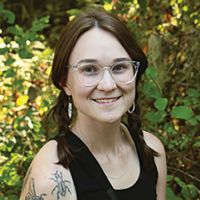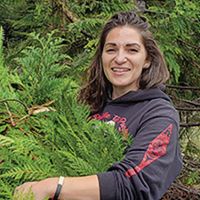
Cristina Eisenberg, Maybelle Clark Macdonald director of Tribal initiatives in natural resources and associate dean of inclusive excellence at the College of Forestry, is committed to creating a safe space for learning where everyone thrives.
“Inclusive excellence means regardless of barriers like socioeconomic status, gender identity or if you are a first-generation student or a person of color, you will thrive because we are actively working to dismantle and remove barriers to success,” said Eisenberg. “This work is a process and involves the whole community, working together, with cultural humility.”
In her role as director of Tribal initiatives, she leads the newly formed Indigenous Natural Resource Office and within it, the Traditional Ecological Knowledge (TEK) Lab.
“Tribal initiatives have everything to do with inclusive excellence,” said Eisenberg. “My job was created to take the College of Forestry beyond the land acknowledgment, which is not just about Indigenous peoples — it’s about everybody.”
The Indigenous Natural Resource Office guides people and the institutions with whom they work to find ways to support and empower Indigenous peoples and their communities while advancing social justice. Their work braids together TEK and western science and research to find solutions to humanity’s most pressing natural resource conservation problems.
“Indigenous peoples have stewarded natural resources for millennia through their knowledge and traditional practices, and we want to decolonize and re-Indigenize the practice of science and advance holistic, systems-based thinking,” said Eisenberg.
A priority for Eisenberg is to create, facilitate and support intercultural collaborative partnerships between Indigenous peoples, OSU, Federal agencies and conservation non-profits that identify mutual research interests, determine the tools needed and then co-create solutions that honor Tribal sovereignty.
Gail Woodside, Tribal liaison for the Indigenous Natural Resource Office and TEK Lab, says it’s important that work with sovereign Tribal Nations be centered around not only decolonizing and partnering, but also following best practices and protocols.
“One way to do this, is to create a Memorandum of Understanding to lead and inform action,” said Woodside. “As binding, enforceable contracts, these MOU’s assist in protecting local knowledge, Elder interaction, and research processes in ceded lands, territories and fisheries in usual and accustomed locations.”

Honoring Tribal sovereignty also means confronting the reality of what it means to be a land grant institution within an academic system founded on principles of settler colonialism.
“It means going beyond acknowledging to accepting responsibility for what was done to Indigenous communities — like forcible removal, displacement and trauma — and finding a solution,” said Eisenberg.
Eisenberg believes education can be a powerful way to heal the damage. She is working to create opportunities and pathways for Tribal youth in higher education, using her lived experience as inspiration.
“I was a first-generation college student and am Latinx and Native American, of mixed Raramuri and Western Apache heritage,” said Eisenberg. “I experienced homelessness, the farthest my parents made it was middle school, but I had a network of mentors that encouraged me to keep going. Everything I do is about paying that back.”
While the TEK Lab’s work takes place in the Western U.S., with a focus on the Pacific Northwest, the lab aspires to build allyships across cultures worldwide. Co-Principal Investigators like Tom DeLuca, dean of the College of Forestry, Tom Kaye of the Institute of Applied Ecology, and Luhui Whitebear of the Kaku-Ixt
Mana Ina-Haws, embody this type of allyship.
“There is a hunger for Tribal inclusion, Tribal sovereignty, and honoring and respecting TEK,” said Eisenberg. “And the College of Forestry is filled with changemakers, embodying inclusive excellence and allyship. From those who work within the Indigenous Natural Resource Office and participate in the
College’s Diversity, Equity and Inclusion workgroup, to those who work across the University, I have so much hope and feel so supported.”
TRADITIONAL ECOLOGICAL KNOWLEDGE LAB
Housed within the Indigenous Natural Resource Office, the TEK Lab includes Program Manager Holly Needham and project staff Savannah Buckman Spottedbird. Co-PI’s include Tom DeLuca, Tom Kaye, Luhui
Whitebear and Si Gao. Gail Woodside is the Tribal liaison and a postdoctoral scholar. The current graduate students are included below.

Tessa Chesonis
“My research honors multiple ways of knowing and explores the benefits of moving away from a westernized approach to ecosystem management.”

Allison Monroe
“Our research is based in reciprocity. In an increasingly challenging field, it is an honor to conduct research driven by both curiosity and care.”

Brooklyn Richards
“I am interested in working within the nexus of TEK and western science to study the relationships between pollinators and plants in forest ecosystems.”

Ashley Russell
“I am researching various vegetation treatments and reforestation methods, including my Tribe’s traditional methods, and how they affect the regeneration of culturally significant species.”
A version of this story appeared in the Spring 2023 issue of Focus on Forestry, the alumni magazine of the Oregon State University College of Forestry.

